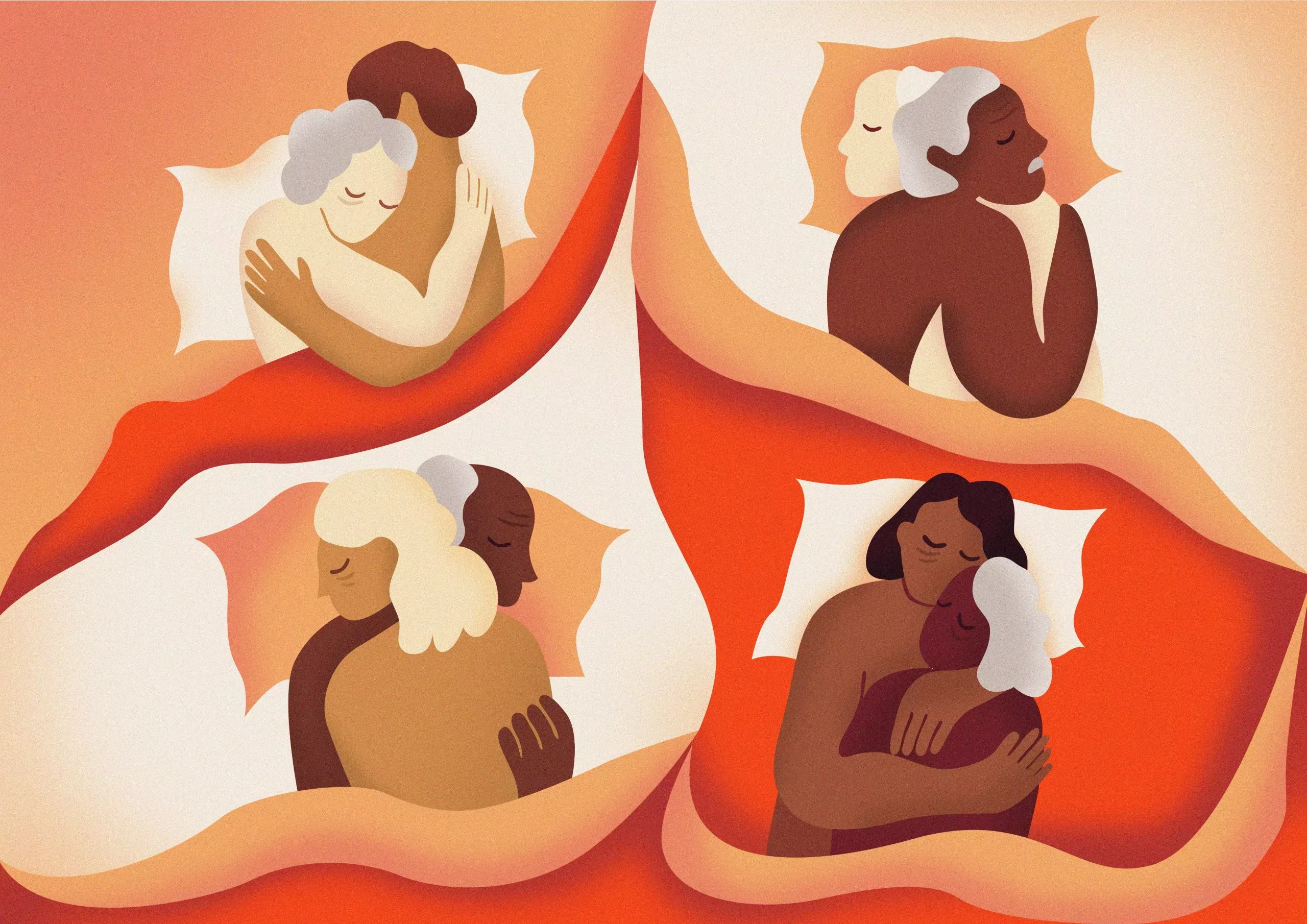Your cart is currently empty!

Virginie B Is More Explicit Than Ever in Her New Single SEXUS: Reflections on Women’s Sexuality in Music
🎵 “Tout ce dont j’ai besoin, entre ses jambes, envie de passer le plus clair de mon temps dans ta chambre, et j’envie, et j’envie toutes celles qui t’ont déjà goûté…” (“Everything I need, between their legs, want to spend most of my time in your room, and I envy, and I envy all those who have tasted you”) 🎵
Is anyone else here getting hot or is it just me? This is just an extract from the sensual lyrics of Virginie B’s new single (featuring Calamine), entitled SEXUS. With a title like that, who better than Club Sexu to discuss it?
Virginie B and Calamine meet
Virginie B, a singer-songwriter from Sherbrooke, spoke with us about her artistic journey, her experience talking about sex in the Quebec music scene and, of course, about her new single, SEXUS.
Imbued with both a sensual and soothing energy, this song is the culmination of the exploration of themes that touch on love, sexuality, and expectations vis-à-vis oneself and others. “It’s an introspective, psychological approach,” explains Virginie. The lyrics, which evoke her desires and sexuality positively and without shame, are like candy for our ears.

Without a hint of hesitation, Virginie identifies as a feminist artist. Although she doesn’t see herself as an activist through her lyrics, she nevertheless recognizes that in our society, simply singing as a woman the way she does is a political act in and of itself: “My speech is not necessarily militant at first sight,” she says before adding that this is also one of the reasons that encouraged her to want to collaborate with Calamine, who according to her, “democratizes a super-open discourse on desire.”
Calamine, aka Julie Gagnon, aka the Révélation Radio-Canada 2021–2022, also achieves a nice balance between political discourse and personal experiences in her songs. Recently interviewed on the podcast Les Impostures, she aptly explains it: “For me, music isn’t just a political pamphlet: I want it to be a reflection of existence. We can be activists, but we also exist, we have an everyday life, relationships with others, an inner life, and existential reflections that are not necessarily militant in nature.”
Censorship 101
“This is where explicitness comes in. You can talk about relationships, but can you address themes as straightforward as orgasm or pleasure?”
SEXUS is crude, lascivious, and perfectly explicit: exactly how we like our music 👅. However, this isn’t a commonly shared opinion in the Quebec music scene, especially on the radio. Indeed, for Virginie, it was clear from the start that her song wouldn’t be broadcast there and would instead have to be broadcast on an online platform such as that of Club Sexu.
Quebec radio (especially Francophone radio) often goes all out for censorship. Here, the idea isn’t to criticize this media, but rather to reflect on why it censors. Let’s get one thing clear: talking about sex and pleasure explicitly in songs (or just in general, actually), as a woman or a gender-diverse person can be… rough, to put it mildly!
So, how does censorship on Quebec radio work? What they decide to censor remains, for the most part, subjective. Although the radio is a medium governed by laws and a code of ethics, broadcasters have generous leeway with regard to the content that gets broadcast. Swear words and so-called vulgar remarks are normally the first to be censored in a song, although an English swear word is less likely to be struck out on Francophone radio, since according to broadcasters, not everyone will understand it. In the end, the radio managers are the ones who judge what will be acceptable (or not) in the eyes of the public.
What about sex?

Censorship is not a recent phenomenon in Quebec society; it is rooted in our (very) religious past. Despite a few cases here and there before the 17th century, it was around the 1840s that the Church really began to use its power to censor newspapers and other writings that went against its moral laws (Hébert, 2001). The arts were not spared: many themes have been subject to censorship, including sexuality—particularly women’s.
Until the mid-20th century, at least when it came to sexuality, women could be summed up in a few words: passive, frigid, and engaging in sex only for procreation (Perreault, 2004). The notions of female orgasm and pleasure were then non-existent, in the fields of both religion and science.
Are we currently witnessing the influence of Quebec’s Catholic moralizing past through the censorship of women’s sexuality and its associated shame?
A double standard as persistent as an earworm
Even though it seems like we’re singing more and more about sex and female pleasure in music outside Quebec, these topics remain controversial. No need to look any further than more mainstream artists like Missy Elliott, Lil Kim, Cardi B (I’m looking at you, WAP), Aya Nakamura, and Sexy Sushi (a very good example brought up by Virginie B), who all explicitly mention female orgasm and pleasure in their songs. They gathered attention and elicited moral panic around the globe! Do we react the same way when we hear similar sexual comments from men, who sing and rap about their own pleasure and the pleasure that they (supposedly) give to women?
This double standard is present on Quebec’s arts scene, and not only when it comes to what is deemed acceptable to say (or sing): a wage gap persists between genders. Canadian and Quebec data show that female Francophone artists are paid less than their male counterparts (Robineau, 2013). Big surprise.
In terms of visibility, the Musique bleue movement posted an open letter last year calling out the lack of representation of women and gender-diverse people on Quebec radio stations. Data collected from 2020 to 2021 has also shown that only 2% to 30% of the artists we hear on popular Quebec radio stations are people other than men (Musique bleue, 2021)!
It’s also impossible to ignore the very high expectations regarding women’s appearance (in the music industry, obviously, but everywhere else as well). Beauty standards seep into so many facets of presentation, from make-up, clothing, and age, to plain old stereotypes. It’s always too much or never enough. Virginie brings up the example of Marjo, a Quebec rock icon, who shocked the crowds on more than one occasion with looks that were deemed provocative (😉), but we can also think of Safia Nolin (Safia, we love you!), who hasn’t had a second’s respite since the start of her career.
I don’t need a man
“I’d like to push the boundaries in the music industry in Quebec. I’d like to show a shame-free openness to discourse and to talk more explicitly about several subjects.”
Virginie is well aware that navigating the arts world as a woman or gender-diverse person can be challenging. For her, one of the main issues remains that people automatically wonder if the artist has been backed by a man (e.g., in production or in management), and never whether she has worked alone or with other women.
Her goals and background reflect her desire to make a difference. Becoming a producer was a feminist goal for the singer-songwriter: making her own money and her own decisions means “being able to have a say in the entire creative process,” says Virginie. Not only that, but it also means acquiring knowledge on how the industry works, knowing where to find the right contacts, and not having to depend on others (in this case, on men)! For her, that is true independence in the music scene.
SEXUS addresses explicit themes that touch on sexuality and desire, something that, according to Virginie, some Quebec rap artists are already doing. However, the musical genre of her new song (and of her future album 🤫) isn’t quite established in Quebec and will (pleasantly) surprise more than a few!
You can now listen to SEXUS on Spotify and, if you feel like it, you can also follow Virginie B and Calamine on Instagram:
-
Canadian Association of Broadcasters. (2002). Canadian Association of Broadcasters’ code of ethics. https://www.cbsc.ca/codes/cab-code-of-ethics/
Corbeil, C., & Marchand, I. (2006). Penser l’intervention féministe à l’aune de l’approche intersectionnelle: défis et enjeux [Conceptualizing feminist intervention using an intersectional approach: Issues and challenges]. Nouvelles pratiques sociales, 19(1), 40–57. https://doi.org/10.7202/014784ar
Fassa, F., Lépinard, É., & i Escoda, M. R. (2006). L’intersectionnalité : pour une pensée contre-hégémonique [Intersectionality: For counter-hegemonic thought]. Journal of Women’s Studies, 13(3), 7–26.
Hébert, P. (2001). La censure religieuse au Québec : deux ou trois choses que je sais d’elle… [Religious censorship in Quebec: A couple things I know about it…], Québec français, 120, 74–76. https://id.erudit.org/iderudit/56003ac
Musique Bleue. (2021). #Musiquebleue, c’est quoi? [What’s #Musiquebleue?] https://www.musiquebleue.org/apropos/
Perreault, I. (2004). Morale catholique et genre féminin : la sexualité dissertée dans les manuels de sexualité maritale au Québec, 1930–1960 [Catholic morality and the female gender: Sexuality as discussed in marital sexuality manuals in Quebec, 1930–1960]. Revue d’histoire de l’Amérique française, 57(4), 567–591. https://doi.org/10.7202/009642ar
Robineau, A. (2013). Inégalités et minorisation des identités chez les femmes artistes dans la francophonie canadienne [Inequalities and marginalization of identities among female Francophone artists in Canada]. Nouvelles perspectives en sciences sociales, 8(2), 145–174. https://doi.org/10.7202/1016474ar





